In the modern world of software development, efficiency is crucial to gain a competitive advantage. It's no secret that we at 10KB are fans of DevOps, but what exactly is DevOps? And what makes it often the key to achieving the most significant gains in application professionalization?
How to achieve benefits by focusing on DevOps
Including six strategies that your company can implement
Written by Linda
The origin story of DevOps
The diminishing distinction between working with hardware and software
A long time ago (in a galaxy far, far away), when you could install whole programs on a 1.44 MB floppy disk, the worlds of developers and system operators were completely separate. One was involved in software design, while the other took care of hardware, such as a set of hard drives in the basement. It's hard to imagine that nowadays. With gigantic data centers spread across the world and software that needs to be accessible anytime, anywhere, for hundreds of users simultaneously, the fields of system administration and development are becoming increasingly similar. Both engage in coding fervently; one codes servers, hard drives, and databases in the cloud, while the other builds the most dynamic applications. A DevOps engineer (a combination of "Development" and "Operations") possesses knowledge of both areas and acts as a bridge between these two fields. DevOps emphasizes automation, continuous integration, continuous delivery, and continuous deployment.

What is the added value of a DevOps engineer?
We understand that speed is crucial for conversion. For example, consider this research that shows how conversion rates halve when a page loads in 2 seconds compared to 1 second. If you were to ask a system administrator how to make your page 1 second faster, they would likely try to address it in the infrastructure: adding more/bigger/better servers or adjusting the server configuration. If you ask the same question to a developer, they would try to achieve that one-second improvement within the application itself, such as compressing images or utilizing faster techniques. Both approaches may succeed in gaining that one-second improvement, but the question remains whether it's the most (cost) effective solution. With their understanding of both the (online) infrastructure and the software that interacts with that infrastructure, a DevOps engineer will always know where the most gains, improvements, and performance results can be achieved. They can make more targeted choices and adjustments in the specific areas that cause delays.
Is a DevOps engineer relevant even if I already have a fast application?
Even if you already have a blazingly fast application, you should not dismiss your DevOps engineer. They are particularly valuable when it comes to adding new features! During the transition from the development environment to the live deployment of an application, things can sometimes go wrong. This can be time-consuming and often leads to frustration. If you want to automate this process (through deployment automation), you usually need two individuals: a SysOps engineer who understands the infrastructure and a developer who understands the application. They work together to create a deployment. However, a DevOps engineer, who possesses sufficient knowledge of the application and is well aware of the infrastructure's capabilities, can single-handedly automate the deployment, saving time (and thus money). A good DevOps engineer primarily focuses on efficiency, both in front of and behind the scenes.

How can DevOps contribute to profitability?
- Faster time-to-market: By implementing DevOps practices (such as deployment automation), the time required to bring software from development to deployment is significantly reduced. This allows you to introduce new features and improvements to the market more quickly, gaining a competitive advantage and increasing profitability.
- Improved quality: DevOps includes automated testing, continuous monitoring, and rapid feedback mechanisms. These practices ensure that any bugs or quality issues are detected and addressed early on. By improving the quality of software, you can increase customer satisfaction and reduce complaints and returns.
- More efficient resource utilization: Through automation, development teams can focus on value creation rather than manual tasks, while operational teams spend less time troubleshooting and managing infrastructure. This results in better resource utilization, lower operational costs (do you really need that much server space?), and ultimately higher profit margins.
6 strategies for achieving profit through DevOps
- Cultural Change: It is essential to foster a culture of collaboration and communication between development and operations. If they are still working in silos, it's high time to invest in team-building activities! Encourage knowledge sharing and promote a mindset of continuous improvement.
- Automation: Implement automated processes for build, test, deployment, and monitoring. This reduces manual errors and increases the speed and reliability of software delivery. By automating repetitive tasks, teams can focus on delivering value to customers and increasing profitability.
- Continuous Integration and Continuous Delivery (CI/CD): Implement CI/CD pipelines to streamline software development and deployment. With CI/CD, changes are regularly and automatically integrated, tested, and delivered to production environments. This results in shorter development cycles, faster time-to-market, and increased productivity, ultimately benefiting profitability.
- Monitoring and Feedback: Implement robust monitoring tools to monitor the performance of applications and infrastructure. Collecting data and gaining insights into system performance enables teams to proactively detect and resolve issues before they impact business operations. By responding quickly to incidents and ensuring an optimal user experience, profitability can be maximized.
- Agile and Iterative Approach: DevOps pairs well with agile development methodologies such as Scrum or Kanban. Working in short iterations allows teams to deliver value quickly and adapt to changing customer needs. A flexible approach minimizes waste, maximizes efficiency, and increases customer satisfaction.
- Continuous Improvement: Strive for a culture of continuous improvement through feedback and retrospectives. Encourage teams to constantly evaluate and experiment, enabling them to improve themselves and the processes they follow.
Conclusion
Implementing DevOps practices can bring significant benefits to businesses, including faster time-to-market, improved software quality, more efficient resource utilization, and higher profit margins. By paying attention to DevOps and applying strategies, you are looking specifically at where the gains can be made, rather than randomly tweaking settings. However, it requires a cultural change, investment in automation, implementation of CI/CD pipelines, and embracing an agile and continuous improvement mindset. With the right approach, DevOps can play a key role in driving profitable growth for your organization.
